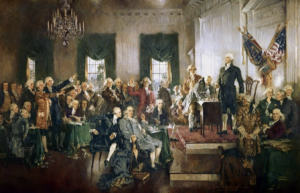 KC Becker, who lives in Boulder and represents District 13, is the now the Speaker of the Colorado House of Representatives. She penned this op-ed on September 25, 2018, while majority leader.
KC Becker, who lives in Boulder and represents District 13, is the now the Speaker of the Colorado House of Representatives. She penned this op-ed on September 25, 2018, while majority leader.
We deserve a democracy that puts hardworking Coloradans ahead of wealthy special interests and the well-connected. No one can deny the powerful influence of money in politics that really took off after the 2010 Citizens United Supreme Court decision. That decision opened the door to unlimited, undisclosed money in campaigns for public office at every level. It is critical to rein in this alarming practice, which is drowning out the voices of everyday citizens.
And the problem is getting worse. This summer, ahead of a critical election, the Trump administration announced that the IRS will no longer require tax-exempt organizations — designated as 501(c)(4)s under the tax code — to disclose the names or addresses of their donors on their annual tax returns. Coloradans across the political spectrum should be alarmed by this move to reduce transparency, erode our democracy and allow mystery money to flood our elections.
There is a problem, but solutions to this challenge are hard. One well-intentioned group has been canvassing Boulder residents asking them to advocate for the state legislature to call for a constitutional convention to overturn Citizens United.
Citizens United was a bad decision with horrible consequences and it needs to be overturned. But a constitutional convention is a dangerous approach to fixing this problem and shouldn’t be pursued.
Article V of the Constitution provides two avenues for amendment. The first requires a two-thirds vote of both chambers of Congress and then ratification by three-fourths of the states. The second is a constitutional convention called for by 34 states. Since our Constitution was ratified in 1788 we have never used the second method. Once assembled, there are no specific rules for how such a convention would be governed.
Legal scholars may not all agree on whether a constitutional convention is a good idea, but they do agree on one thing: No one knows with any certainty what it would look like or how far-reaching the changes could be. Importantly, nothing in the Constitution limits a convention to the issues for which it was called; attempts to restrict it to one subject may or may not be honored.
Our fundamental freedoms, guaranteed by the Bill of Rights, could be at risk at this kind of unprecedented and unregulated event.
The same mystery money that we are trying to fight could achieve a new level of influence in a constitutional convention. We do not know who the delegates would be or how far-reaching the convention could go; but with much on the line, special interests will do everything they can to undermine attempts to limit their power and to make changes to the Constitution that will benefit them. Without clear rules for how such a convention would work, and in an age of mystery money, can we really risk these unknowns? Once a convention is called, our entire Constitution could be rewritten.
During Colorado’s last legislative session, resolutions proposing Article V conventions were defeated with bipartisan opposition in both chambers. Progressive groups like Planned Parenthood, ACLU and Common Cause all oppose a constitutional convention for many of the reasons outlined above. And Democrat-controlled state legislatures in other states have repealed their previously passed resolutions in support of a constitutional convention.
An Article V constitutional convention is too risky and prone to unintended consequences to pursue. So what can we do to limit the influence of special interests in our political system and restore the voices of the people? Ultimately we need a comprehensive fix at the federal level. But in our current, highly polarized environment, such reforms are hard to fathom.
In the absence of federal leadership, states must lead. At the legislature, Democrats have fought back against the destructive effects of mystery money on our democracy. I’ve sponsored several bills to bring more transparency to elections. In 2017, I carried two bills to expand disclosure requirements for political spending and shed light on who is backing election communications.
Those bills all died in the Republican-controlled Senate. But we will continue fighting to enact real reforms to campaign finance laws that close loopholes and shine light on mystery money.
Our Constitution has never been at greater risk and we must continue to defend it at the polls in November. Creating a democracy where everyone’s voice is heard regardless of the size of their bank account is critical; together we can do that. But in doing so, I beg caution that we not put our Constitution and our civil liberties at risk.
KC Becker, who lives in Boulder and represents District 13, is the now the Speaker of the Colorado House of Representatives. She penned this op-ed on September 25, 2018, while majority leader.
